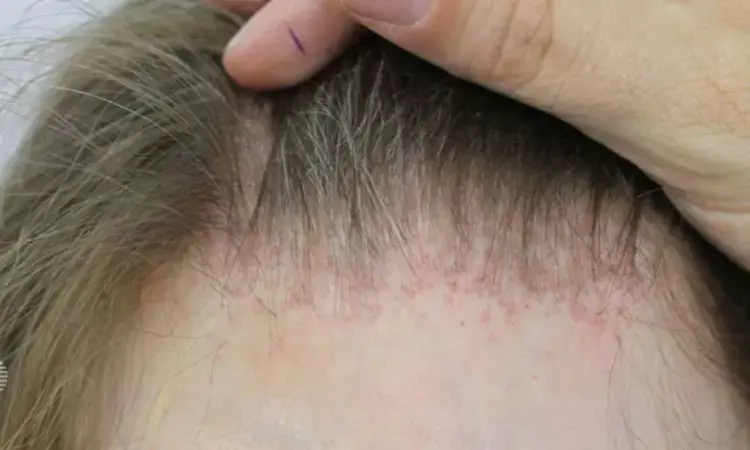- Home
- Medical news & Guidelines
- Anesthesiology
- Cardiology and CTVS
- Critical Care
- Dentistry
- Dermatology
- Diabetes and Endocrinology
- ENT
- Gastroenterology
- Medicine
- Nephrology
- Neurology
- Obstretics-Gynaecology
- Oncology
- Ophthalmology
- Orthopaedics
- Pediatrics-Neonatology
- Psychiatry
- Pulmonology
- Radiology
- Surgery
- Urology
- Laboratory Medicine
- Diet
- Nursing
- Paramedical
- Physiotherapy
- Health news
- Fact Check
- Bone Health Fact Check
- Brain Health Fact Check
- Cancer Related Fact Check
- Child Care Fact Check
- Dental and oral health fact check
- Diabetes and metabolic health fact check
- Diet and Nutrition Fact Check
- Eye and ENT Care Fact Check
- Fitness fact check
- Gut health fact check
- Heart health fact check
- Kidney health fact check
- Medical education fact check
- Men's health fact check
- Respiratory fact check
- Skin and hair care fact check
- Vaccine and Immunization fact check
- Women's health fact check
- AYUSH
- State News
- Andaman and Nicobar Islands
- Andhra Pradesh
- Arunachal Pradesh
- Assam
- Bihar
- Chandigarh
- Chattisgarh
- Dadra and Nagar Haveli
- Daman and Diu
- Delhi
- Goa
- Gujarat
- Haryana
- Himachal Pradesh
- Jammu & Kashmir
- Jharkhand
- Karnataka
- Kerala
- Ladakh
- Lakshadweep
- Madhya Pradesh
- Maharashtra
- Manipur
- Meghalaya
- Mizoram
- Nagaland
- Odisha
- Puducherry
- Punjab
- Rajasthan
- Sikkim
- Tamil Nadu
- Telangana
- Tripura
- Uttar Pradesh
- Uttrakhand
- West Bengal
- Medical Education
- Industry
Pioglitazone reverses hair loss in patient with cicatricial alopecia: Case report

USA: In a recent case study published in JAAD Case Reports, the researchers from the USA have described an exceptional case of hair regrowth with oral pioglitazone, topical minoxidil foam, topical clobetasol solution, and low-level laser therapy in a patient with a biopsy-confirmed diagnosis of lichen planopilaris (LPP).
The unique case showed dramatic hair regrowth in patients with twice biopsy-confirmed cicatricial alopecia. The case is the first to describe hair regrowth in cicatricial alopecia linked with pioglitazone addition.
According to the authors, pioglitazone was the primary contributor to hair regrowth in cicatricial alopecia; this is because regrowth was observed four months after pioglitazone incorporation and failure to prior therapies to control disease activity.
"This case established that hair regrowth is possible with treatment. However, further studies are warranted into the inflammatory process underlying disease pathogenesis to explain how these treatments work to cause regrowth in scarred areas," the authors wrote.
Cicatricial alopecia is a type of hair loss in which inflammation targets and ultimately destroys the hair follicle, leading to the loss of follicular ostia. No cure exists; however, current first-line treatments aim to terminate the inflammatory process for further hair loss prevention and ease symptoms. The treatments include immunosuppressants, topical and intralesional corticosteroids, and 5-α reductase inhibitors. Additional medications, including pioglitazone, are considered adjuvant therapies in cases of failure of first-line therapies fail to control disease progression and alleviate symptoms.
Due to the conditions' permanent destruction of multipotent follicular stem cells, hair growth is unexpected during the treatment course. In patients with cicatricial alopecia, rare cases of hair regrowth have been sporadically reported.
The case described by Maria Karim, Hackensack Meridian School of Medicine, Nutley, New Jersey, and colleagues is of a 52-year-old female with a history of hypothyroidism, basal cell carcinoma, and anemia who presented at a clinic for evaluation of biopsy-confirmed LPP.
At the 6-month follow-up, the patient was initiated on oral pioglitazone 30 mg daily and began using a near monochromatic low-level laser therapy device every other day. After six weeks, her symptoms remained with continued hair loss and scalp pruritus, prompting the initiation of oral methotrexate 15 mg once weekly combined with a folic acid 1-mg supplement. After one month, she showed minimal improvement with mild residual itching, prompting methotrexate discontinuation. Three months later, she led a remarkable increase in hair density at the previously alopecic scarred area, and scalp pruritus also resolved. The physicians observed no signs of active inflammation on trichoscopy.
Reference:
Karim M, Klein EJ, Brinster N, Rieder E, Lo Sicco K, Shapiro J. Reversible hair loss in a patient with cicatricial alopecia: A case of regrowth associated with pioglitazone use. JAAD Case Rep. 2022 Aug 10;28:21-23. doi: 10.1016/j.jdcr.2022.07.038. PMID: 36090197; PMCID: PMC9459670.
Dr Kamal Kant Kohli-MBBS, DTCD- a chest specialist with more than 30 years of practice and a flair for writing clinical articles, Dr Kamal Kant Kohli joined Medical Dialogues as a Chief Editor of Medical News. Besides writing articles, as an editor, he proofreads and verifies all the medical content published on Medical Dialogues including those coming from journals, studies,medical conferences,guidelines etc. Email: drkohli@medicaldialogues.in. Contact no. 011-43720751


